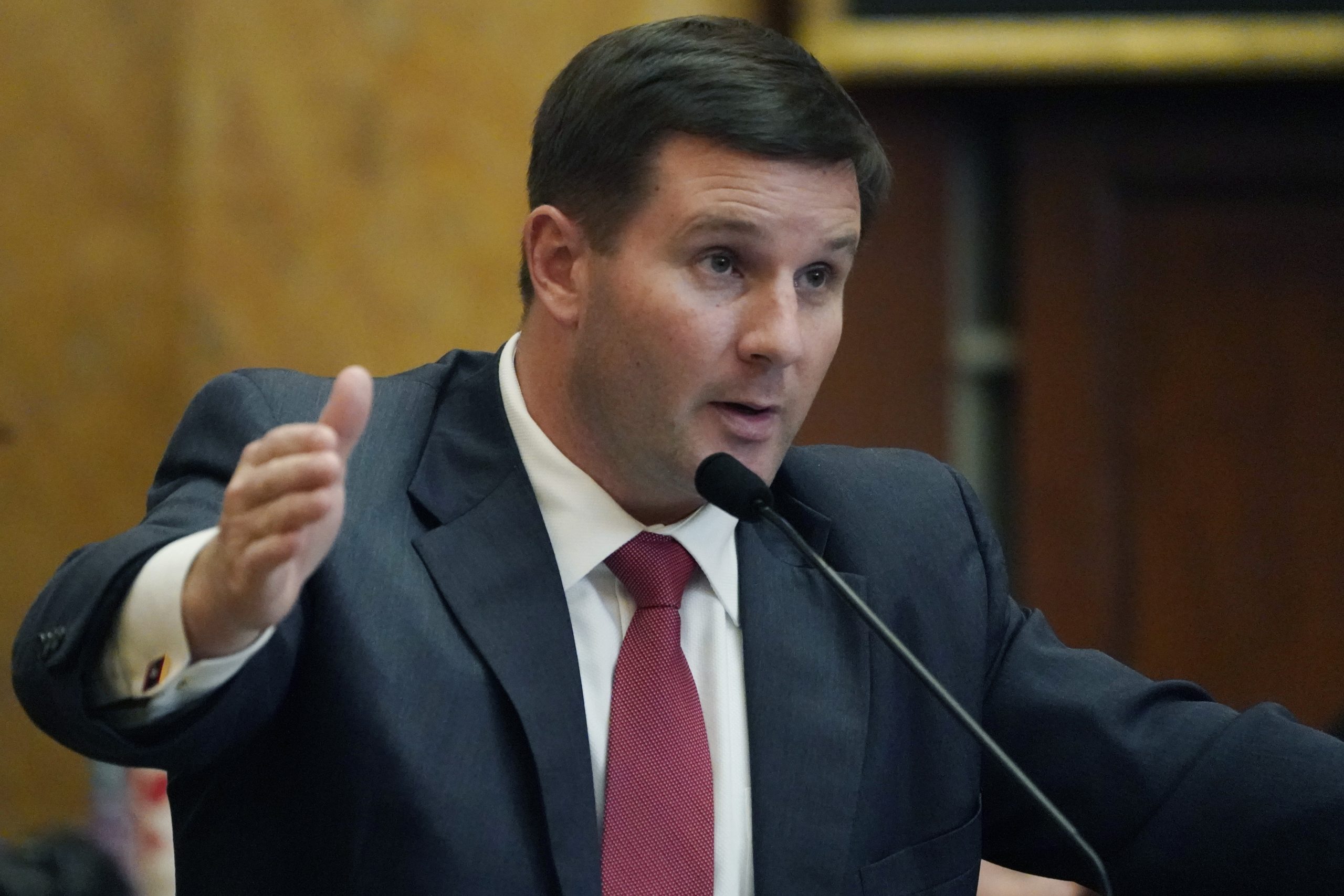Mississippi Today
Does a backlog in Hinds County courts justify appointing five judges? Other counties could be far worse

Does a backlog in Hinds County courts justify appointing five judges? Other counties could be far worse
Lawmakers backing House Bill 1020 say Hinds County’s backlog of cases is an emergency that justifies having five non-elected judges to pick up the slack.
Cliff Johnson, attorney and director of the MacArthur Justice Center, wants to know whether Hinds County really has the worst case backlog in the state. Bill author Rep. Trey Lamar, R-Senatobia, has said the bill is a way to address crime in Jackson and the backlog in the Hinds court system.
“Our conclusion at this point is that the Legislature could not have made the decision to appoint five temporary judges to the Hinds County Circuit Court based on any meaningful analysis of that court’s dockets as compared to the dockets in any other circuit,” Johnson told Mississippi Today.
The center began calculating the number of open criminal cases in each circuit court district between Jan. 1, 2013 and Feb. 26 before realizing Mississippi Electronic Courts — the only public-facing access to case information — doesn’t keep accurate information on pending cases.
Only about half of all counties in the state use MEC. Without data on pending criminal cases, it is difficult to tell if there are case backlogs anywhere and be able to make comparisons, Johnson said.
Hinds County could benefit from additional elected judges, Johnson said, but he couldn’t find the basis to determine the need to appoint five temporary judges — a number that is greater than the number of elected judges.
Legislation passed in 2018 gives the Supreme Court chief justice the ability to appoint temporary judges “in the event of an emergency or overcrowded docket.”
Johnson said it is unclear whether the Senate version of HB 1020 references this law to make temporary appointments or if the bill is a “novel attempt” to appoint judges without determining the existence of an emergency or an overcrowded docket.
The Senate’s Judiciary A Committee passed HB 1020 with multiple changes: the elimination of a proposed separate, unelected judicial district within Jackson and the expansion of the Capitol Complex Improvement District where the Capitol Police operates.
Hinds County, the Seventh Circuit Court District, had 2,508 pending cases, according to MEC data. That is a load of 627 cases each for four judges, according to the data. Over 230,000 people live in the county.
The First Circuit Court District in the northeast part of the state has 8,522 pending cases. That district also has four judges, and its caseload calculated from MEC data is about 2,130 cases per judge.
That district is made up of seven counties and most of the cases came from the largest, Lee County, which had 2,627 pending cases, according to MEC data.
“As we began running reports on criminal dockets, it appeared to us that the backlog in Hinds County was not significantly worse than many other places in Mississippi,” Johnson said. “In fact, our research showed that according to MEC, even a small county like Lee County had more pending criminal cases than Hinds County.”
Staff from the Lee County Circuit Clerk’s Office and circuit court said Wednesday there is no way to know how many open criminal cases there are. Circuit Clerk Camille Roberts Dulaney did not respond to a request for comment.
The state’s Administrative Office of Courts tracks information about disposed cases across the state, but not current criminal cases, Johnson said. The office’s annual report shows disposition numbers for criminal cases and counts during a 10-year period.
Spokesperson Beverly Kraft referred comment about case backlogs to Greg Snowden, director of the Administrative Office of Courts. He did not respond to a request for comment.
Accurate caseload counts are among issues raised about HB 1020, which is seen by many Jacksonians as a takeover of local control.
“This bill would make Mississippi a model for red states with blue capital cities. At its core, this bill is about lawmakers giving themselves the ability to outmaneuver the federal government,” Mayor Chokwe Antar Lumumba said in a statement. “So, by policy or through actually preventing people to vote, it still reflects the poorest version of Mississippi.”
The latest version of HB 1020 also gives the Capitol Police concurrent jurisdiction throughout Jackson and beyond the Capitol Complex Improvement District. It would require the city and the Department of Public Safety to sign a memorandum of understanding.
Lumumba said the memorandum isn’t really an agreement between the two parties, and a spokesperson confirmed he would not sign one.
The bill says failure to execute a memorandum of understanding will not affect Capitol Police’s jurisdiction within Jackson, and any disputes about law enforcement function of Capitol Police in the city would be resolved in favor of the DPS commissioner, who oversees the force.
JXN Undivided, a coalition of community groups such as the People’s Advocacy Institute, One Voice and the Mississippi Center for Justice, is speaking out against HB 1020 and circulating a petition titled “Jackson is NOT for the Taking!”
“What is happening in Jackson, Mississippi, is ruthless,” the petition reads. “It is racist. It is dangerously anti-democratic. And it must stop!”
As of Monday, the petition has received over 1,800 signatures and will be sent to Lt. Gov. Delbert Hosemann, who presides over the Senate, the body that is set to vote on HB 1020.
JXN Undivided also has an open survey for people to share information about their encounters with the Capitol Police, including how officers treated them and how many encounters they have had.
To test how accurate MEC’s case information is, Mississippi Today reached out to the seven circuit court clerks in the First District.
Tishomingo County, the smallest in the circuit court district, has 467 open criminal cases, according to MEC data. It’s a number that Circuit Clerk Josh McNatt said is fairly accurate, but may be “a little over exaggerated” but no more than 5 to 10%.
He has been having conversations with the district attorney, judges and public defenders in the county about how to track case information better.
“I’ve been keeping up with this myself because I’ve been concerned about caseloads,” McNatt said.
This article first appeared on Mississippi Today and is republished here under a Creative Commons license.
Did you miss our previous article…
https://www.biloxinewsevents.com/?p=223444
Mississippi Today
Mississippi River flooding Vicksburg, expected to crest on Monday
Warren County Emergency Management Director John Elfer said Friday floodwaters from the Mississippi River, which have reached homes in and around Vicksburg, will likely persist until early May. Elfer estimated there areabout 15 to 20 roads underwater in the area.
“We’re about half a foot (on the river gauge) from a major flood,” he said. “But we don’t think it’s going to be like in 2011, so we can kind of manage this.”
The National Weather projects the river to crest at 49.5 feet on Monday, making it the highest peak at the Vicksburg gauge since 2020. Elfer said some residents in north Vicksburg — including at the Ford Subdivision as well as near Chickasaw Road and Hutson Street — are having to take boats to get home, adding that those who live on the unprotected side of the levee are generally prepared for flooding.



“There are a few (inundated homes), but we’ve mitigated a lot of them,” he said. “Some of the structures have been torn down or raised. There are a few people that still live on the wet side of the levee, but they kind of know what to expect. So we’re not too concerned with that.”
The river first reached flood stage in the city — 43 feet — on April 14. State officials closed Highway 465, which connects the Eagle Lake community just north of Vicksburg to Highway 61, last Friday.

Elfer said the areas impacted are mostly residential and he didn’t believe any businesses have been affected, emphasizing that downtown Vicksburg is still safe for visitors. He said Warren County has worked with the U.S. Army Corps of Engineers and the Mississippi Emergency Management Agency to secure pumps and barriers.
“Everybody thus far has been very cooperative,” he said. “We continue to tell people stay out of the flood areas, don’t drive around barricades and don’t drive around road close signs. Not only is it illegal, it’s dangerous.”
NWS projects the river to stay at flood stage in Vicksburg until May 6. The river reached its record crest of 57.1 feet in 2011.




This article first appeared on Mississippi Today and is republished here under a Creative Commons Attribution-NoDerivatives 4.0 International License.![]()
Mississippi Today
With domestic violence law, victims ‘will be a number with a purpose,’ mother says
Joslin Napier. Carlos Collins. Bailey Mae Reed.
They are among Mississippi domestic violence homicide victims whose family members carried their photos as the governor signed a bill that will establish a board to study such deaths and how to prevent them.
Tara Gandy, who lost her daughter Napier in Waynesboro in 2022, said it’s a moment she plans to tell her 5-year-old grandson about when he is old enough. Napier’s presence, in spirit, at the bill signing can be another way for her grandson to feel proud of his mother.
“(The board) will allow for my daughter and those who have already lost their lives to domestic violence … to no longer be just a number,” Gandy said. “They will be a number with a purpose.”
Family members at the April 15 private bill signing included Ashla Hudson, whose son Collins, died last year in Jackson. Grandparents Mary and Charles Reed and brother Colby Kernell attended the event in honor of Bailey Mae Reed, who died in Oxford in 2023.
Joining them were staff and board members from the Mississippi Coalition Against Domestic Violence, the statewide group that supports shelters and advocated for the passage of Senate Bill 2886 to form a Domestic Violence Facility Review Board.
The law will go into effect July 1, and the coalition hopes to partner with elected officials who will make recommendations for members to serve on the board. The coalition wants to see appointees who have frontline experience with domestic violence survivors, said Luis Montgomery, public policy specialist for the coalition.
A spokesperson from Gov. Tate Reeves’ office did not respond to a request for comment Friday.
Establishment of the board would make Mississippi the 45th state to review domestic violence fatalities.
Montgomery has worked on passing a review board bill since December 2023. After an unsuccessful effort in 2024, the coalition worked to build support and educate people about the need for such a board.
In the recent legislative session, there were House and Senate versions of the bill that unanimously passed their respective chambers. Authors of the bills are from both political parties.
The review board is tasked with reviewing a variety of documents to learn about the lead up and circumstances in which people died in domestic violence-related fatalities, near fatalities and suicides – records that can include police records, court documents, medical records and more.
From each review, trends will emerge and that information can be used for the board to make recommendations to lawmakers about how to prevent domestic violence deaths.
“This is coming at a really great time because we can really get proactive,” Montgomery said.
Without a board and data collection, advocates say it is difficult to know how many people have died or been injured in domestic-violence related incidents.
A Mississippi Today analysis found at least 300 people, including victims, abusers and collateral victims, died from domestic violence between 2020 and 2024. That analysis came from reviewing local news stories, the Gun Violence Archive, the National Gun Violence Memorial, law enforcement reports and court documents.
Some recent cases the board could review are the deaths of Collins, Napier and Reed.
In court records, prosecutors wrote that Napier, 24, faced increased violence after ending a relationship with Chance Fabian Jones. She took action, including purchasing a firearm and filing for a protective order against Jones.
Jones’s trial is set for May 12 in Wayne County. His indictment for capital murder came on the first anniversary of her death, according to court records.
Collins, 25, worked as a nurse and was from Yazoo City. His ex-boyfriend Marcus Johnson has been indicted for capital murder and shooting into Collins’ apartment. Family members say Collins had filed several restraining orders against Johnson.
Johnson was denied bond and remains in jail. His trial is scheduled for July 28 in Hinds County.
He was a Jackson police officer for eight months in 2013. Johnson was separated from the department pending disciplinary action leading up to immediate termination, but he resigned before he was fired, Jackson police confirmed to local media.
Reed, 21, was born and raised in Michigan and moved to Water Valley to live with her grandparents and help care for her cousin, according to her obituary.
Kylan Jacques Phillips was charged with first degree murder for beating Reed, according to court records. In February, the court ordered him to undergo a mental evaluation to determine if he is competent to stand trial, according to court documents.
At the bill signing, Gandy said it was bittersweet and an honor to meet the families of other domestic violence homicide victims.
“We were there knowing we are not alone, we can travel this road together and hopefully find ways to prevent and bring more awareness about domestic violence,” she said.
This article first appeared on Mississippi Today and is republished here under a Creative Commons Attribution-NoDerivatives 4.0 International License.
Mississippi Today
Court to rule on DeSoto County Senate districts with special elections looming
A federal three-judge panel will rule in coming days on how political power in northwest Mississippi will be allocated in the state Senate and whether any incumbents in the DeSoto County area might have to campaign against each other in November special elections.
The panel, comprised of all George W. Bush-appointed judges, ordered state officials last week to, again, craft a new Senate map for the area in the suburbs of Memphis. The panel has held that none of the state’s prior maps gave Black voters a realistic chance to elect candidates of their choice.
The latest map proposed by the all-Republican State Board of Election Commissioners tweaked only four Senate districts in northwest Mississippi and does not pit any incumbent senators against each other.
The state’s proposal would keep the Senate districts currently held by Sen. Michael McLendon, a Republican from Hernando and Sen. Kevin Blackwell, a Republican from Southaven, in majority-white districts.
But it makes Sen. David Parker’s district a slightly majority-Black district. Parker, a white Republican from Olive Branch, would run in a district with a 50.1% black voting-age population, according to court documents.
The proposal also maintains the district held by Sen. Reginald Jackson, a Democrat from Marks, as a majority-Black district, although it reduces the Black voting age population from 61% to 53%.
Gov. Tate Reeves, Secretary of State Michael Watson, and Attorney General Lynn Fitch comprise the State Board of Election Commissioners. Reeves and Watson voted to approve the plan. But Watson, according to meeting documents, expressed a wish that the state had more time to consider different proposals.
Fitch did not attend the meeting, but Deputy Attorney General Whitney Lipscomb attended in her place. Lipscomb voted against the map, although it is unclear why. Fitch’s office declined to comment on why she voted against the map because it involves pending litigation.
The reason for redrawing the districts is that the state chapter of the NAACP and Black voters in the state sued Mississippi officials for drawing legislative districts in a way that dilutes Black voting power.
The plaintiffs, represented by the ACLU, are likely to object to the state’s newest proposal, and they have until April 29 to file an objection with the court
The plaintiffs have put forward two alternative proposals for the area in the event the judges rule against the state’s plans.
The first option would place McLendon and Blackwell in the same district, and the other would place McLendon and Jackson in the same district.
It is unclear when the panel of judges will issue a ruling on the state’s plan, but they will not issue a ruling until the plaintiffs file their remaining court documents next week.
While the November election is roughly six months away, changing legislative districts across counties and precincts is technical work, and local election officials need time to prepare for the races.
The judges have not yet ruled on the full elections calendar, but U.S. Fifth Circuit Court of Appeals Judge Leslie Southwick said at a hearing earlier this month that the panel was committed have the elections in November.
This article first appeared on Mississippi Today and is republished here under a Creative Commons Attribution-NoDerivatives 4.0 International License.
-

 News from the South - Florida News Feed5 days ago
News from the South - Florida News Feed5 days agoJim talks with Rep. Robert Andrade about his investigation into the Hope Florida Foundation
-

 News from the South - Alabama News Feed7 days ago
News from the South - Alabama News Feed7 days agoOp-Ed: Colleges shouldn’t need remedial algebra classes: Five K-8 policy solutions to address math proficiency | Maryland
-

 News from the South - Virginia News Feed7 days ago
News from the South - Virginia News Feed7 days agoHighs in the upper 80s Saturday, backdoor cold front will cool us down a bit on Easter Sunday
-

 News from the South - Arkansas News Feed7 days ago
News from the South - Arkansas News Feed7 days agoValerie Storm Tracker
-

 News from the South - Kentucky News Feed6 days ago
News from the South - Kentucky News Feed6 days agoU.S. Supreme Court pauses deportations under wartime law
-

 Mississippi Today5 days ago
Mississippi Today5 days ago‘Trainwreck on the horizon’: The costly pains of Mississippi’s small water and sewer systems
-

 News from the South - Alabama News Feed4 days ago
News from the South - Alabama News Feed4 days agoPrayer Vigil Held for Ronald Dumas Jr., Family Continues to Pray for His Return | April 21, 2025 | N
-

 News from the South - Texas News Feed4 days ago
News from the South - Texas News Feed4 days agoMeteorologist Chita Craft is tracking a Severe Thunderstorm Warning that's in effect now














































